No longer the same old story
Following protests and online activity, the Russian media are increasingly reporting the truth. By Jonathan Brown

Your support helps us to tell the story
From reproductive rights to climate change to Big Tech, The Independent is on the ground when the story is developing. Whether it's investigating the financials of Elon Musk's pro-Trump PAC or producing our latest documentary, 'The A Word', which shines a light on the American women fighting for reproductive rights, we know how important it is to parse out the facts from the messaging.
At such a critical moment in US history, we need reporters on the ground. Your donation allows us to keep sending journalists to speak to both sides of the story.
The Independent is trusted by Americans across the entire political spectrum. And unlike many other quality news outlets, we choose not to lock Americans out of our reporting and analysis with paywalls. We believe quality journalism should be available to everyone, paid for by those who can afford it.
Your support makes all the difference.When Russians switched on their television sets on Saturday evening, they saw something strange. In a country where television news has long been dominated by detailed reports of what the ruling duo did that day, one item on the evening bulletins looked very different.
It was not a segment devoted to President Dmitry Medvedev opening a hospital or meeting a foreign leader, nor was it a report of Prime Minister Vladimir Putin pulling off yet another superhuman stunt. Instead, it was a segment on mass protests in Moscow, where more than 50,000 people had gathered to demand new elections.
Something, it seemed, had changed. When thousands of people massed in Moscow last Monday, the day after parliamentary elections, opposition leaders were arrested and jailed for 15 days, but state television did not say a word. When more than 500 people were arrested in Moscow at another rally on the next night, the television ignored it yet again. Instead, the First Channel broadcast pictures of teenagers half-heartedly dancing to music and chanting Mr Putin's name at organised pro-government rallies.
Ever since the NTV channel was prised from its oligarch owner and passed over to Gazprom shortly after Mr Putin came to power in 2000, Russian television news has been sterile in the extreme. The heads of the stations have regular meetings in the Kremlin, and sources talk of unofficial "stop-lists" of personalities who are too controversial to feature on the news. Criticism of Mr Putin is unthinkable.
How, then, to explain the extensive and surprisingly balanced coverage across the state-controlled television channels of Saturday's demonstrations? It seems that the Kremlin realised that as the popular mood began to change, it had to take note.
Journalists on state channels had begun to make noises themselves; one NTV anchor publicly announced that he would refuse to read the news on Saturday if it did not feature the protests. There were also reports of journalists refusing to put their names to news packages on the pro-Putin rallies earlier in the week. But most importantly, it appears that someone high up in the Kremlin had realised that with so much discussion of the rallies online, the television would look ridiculous if it did not cover it.
"It's obvious that there was an order," says Maria Makeyeva, deputy editor of TV Rain, an independent television station that broadcasts on cable and online. "The coverage was suddenly completely different."
She says that in the days following the elections, her station's audience grew fivefold, augmented by new viewers hungry for objective information as the state channels remained silent about alleged electoral fraud and the growing mood of protest.
"For many years there has been an unwritten agreement between the government and the television stations about what they can and can't show, but as more and more people have access to the internet, this doesn't work," says Tina Kandelaki, one of Russia's best-known television hosts, who publicly backed United Russia and President Dmitry Medvedev at last week's elections.
Even in the reports of Saturday's protests, the state channels did not show any of the banners featuring slogans relating to Mr Putin. While not everybody at the rally joined in the chants of "Putin – leave!" and "Putin is a thief!", a significant number did, and there was no mention at all of this.
On the Kremlin's English-language channel, Russia Today, which on some topics is freer than its Russian-language equivalent, all the protests have been covered, but editor-in-chief Margarita Simonyan set the tone for the channel's coverage when she wrote on her Twitter feed that the protest leaders should "burn in hell".
But even personalities loyal to the Kremlin agree that for a well-educated society with increasing levels of internet access, the stifling propaganda of state television will have to change.
Among those to address the crowds at the rally on Saturday was Leonid Parfyonov, one of Russia's most famous journalists. Never a particularly radical figure, he surprised the television establishment last year when he used an acceptance speech at an awards ceremony to lay into the Russian news establishment.
"For correspondents of state channels, government officials are not news subjects, but instead the bosses of their bosses," he said.
On Saturday, he called on protesting Russians to take the situation into their own hands, and demand a different kind of television, instead of the "zombie box" with "North Korean-style reports" currently on offer. You are the only people who can change the television," he said. "It's finally time for people to demand that television journalism stops being propaganda."
Join our commenting forum
Join thought-provoking conversations, follow other Independent readers and see their replies
Comments